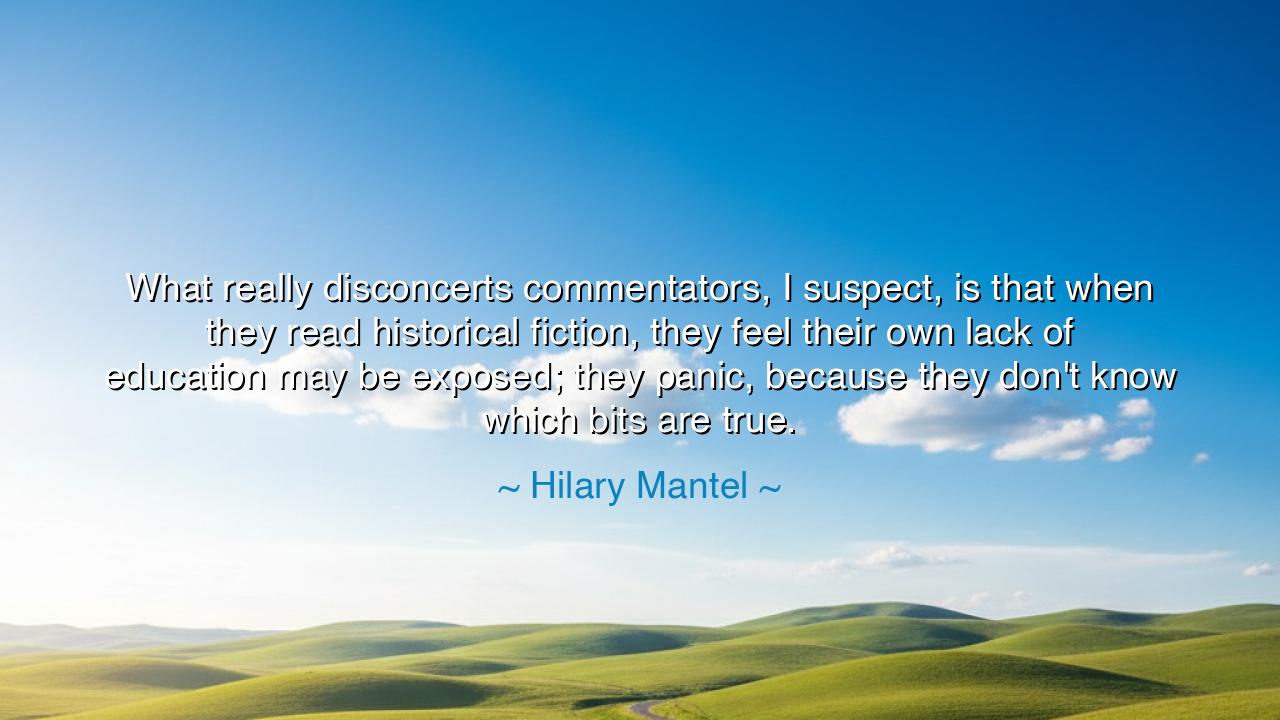
What really disconcerts commentators, I suspect, is that when
What really disconcerts commentators, I suspect, is that when they read historical fiction, they feel their own lack of education may be exposed; they panic, because they don't know which bits are true.






The words of Hilary Mantel pierce like an arrow into the heart of pride: “What really disconcerts commentators, I suspect, is that when they read historical fiction, they feel their own lack of education may be exposed; they panic, because they don’t know which bits are true.” In this, she unveils a timeless truth about both knowledge and ignorance. For men fear not merely the absence of knowledge, but the revelation of that absence. To be ignorant is one thing; to have one’s ignorance revealed before others is a wound to pride, and pride is a fragile armor. Thus Mantel reminds us that the trembling before historical fiction is not about the story itself, but about the mirror it holds up to the reader’s learning—or lack thereof.
Historical fiction is a strange and wondrous craft, for it mingles fact with imagination, truth with invention. It breathes life into dry bones and makes distant centuries walk again among the living. But here lies its power and its danger: the untrained eye cannot always discern what is drawn from the chronicles of history and what is spun from the loom of the novelist. The wise reader delights in this dance, but the proud reader feels exposed, fearing that what he thought he knew may be revealed as shallow. This is what Mantel speaks of: the panic of those whose learning is uncertain.
We see a parallel in the story of the ancient historian Herodotus, whose writings wove together eyewitness accounts, myths, and his own interpretations. Later critics scoffed at him, calling him “the father of lies” because they could not separate his truth from his fables. Yet others honored him as the “father of history,” because through his words, the past became vivid and enduring. The reader who lacked knowledge was bewildered, but the reader who sought wisdom recognized the gift, even in its imperfections. The lesson is clear: confusion is the child of ignorance, but inspiration is the child of humility.
So too in modern times, when Mantel herself wrote of Thomas Cromwell in her great novels, she breathed fire into a man long dismissed by scholars as a shadowy figure. Some critics recoiled, unsure if the Cromwell they beheld was real or imagined. Yet those who read with open minds found not a threat, but an invitation: to deepen their own knowledge of history, to search the records, and to understand that fiction can awaken truths that fact alone leaves buried. In this way, the novelist became a teacher, and those willing to learn found their vision of the past enlarged.
Mantel’s words strike at the arrogance of those who would rather feign certainty than confess ignorance. For truly, ignorance is no shame—but the refusal to learn is. The one who admits “I do not know” opens the door to wisdom. The one who pretends to know, and hides behind scorn, locks himself away in darkness. To read historical fiction and tremble at what one does not know is not a failing; to refuse the chance to seek truth afterward is. The wise man embraces his ignorance, for he knows it is the soil in which understanding may grow.
Therefore, let us not fear the mingling of truth and imagination, but welcome it as a call to inquiry. If a tale confuses you, do not despair; seek the chronicles, the records, the voices of the past, and test the story against them. Let your curiosity be greater than your pride, and you will find that what once seemed uncertain becomes the beginning of deeper knowledge. Historical fiction is not the enemy of truth, but often its companion, pointing us toward the questions we must ask.
In your own life, take this lesson to heart: when you encounter what you do not know, resist the urge to panic or dismiss. Instead, treat it as a guidepost on the road of learning. Be humble before the vastness of history, for no one can master it all. Read boldly, question deeply, and never fear being shown the limits of your knowledge—for in that moment lies the opportunity to grow.
Thus Mantel speaks with the wisdom of ages: the true danger is not ignorance itself, but the fear of revealing it. Cast away this fear, and you will walk with courage among both facts and fictions, gathering wisdom from both, and strengthening the roots of your own understanding. For the past does not belong only to scholars—it belongs to all who are brave enough to seek it.






AAdministratorAdministrator
Welcome, honored guests. Please leave a comment, we will respond soon